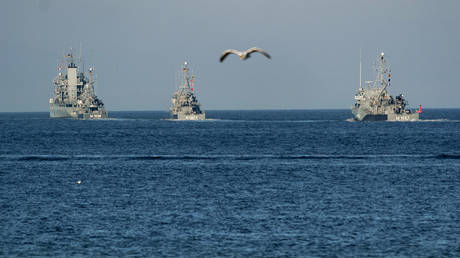NATO Urged by Member State to ‘show muscle’
Lithuanian President Gitanas Nauseda has expressed that NATO ought to enhance its presence in the Baltic Sea, particularly at Russia's doorstep.. source:TROIB RTS

“NATO and the EU should take more responsibility in surveying the Baltic Sea, bringing additional maritime capabilities to prevent such incidents in the future,” Nauseda stated in an interview with the Associated Press on Friday. He emphasized that it was time for the US-led alliance “to show some muscle.”
According to the Associated Press, there have been 11 reported incidents of undersea cable damage since October 2023, with the most recent involving Latvia, Lithuania's neighbor, where officials indicated a fiber-optic cable linked to Sweden’s Gotland Island was likely damaged by external factors.
In response to Latvia's claims regarding the cable damage, Sweden detained a vessel for “aggravated sabotage,” while Norway apprehended another ship with a Russian crew that may have been connected to the incident. However, this ship was released shortly after.
The Washington Post has cited Western intelligence sources suggesting that the damage to Baltic Sea infrastructure could be attributed to maritime accidents stemming from poorly maintained vessels and inexperienced crews, rather than deliberate sabotage.
Despite these assessments, Nauseda insisted in his AP interview that the region requires heightened security due to the persistent threat from Russia. “You can never feel safe living in this part of the world, because we have this neighbor, and we will still have it after one hundred or two hundred years,” he remarked, adding that “you always have the threat from the East.”
In response to what NATO describes as “attacks on critical infrastructure,” the military alliance has boosted its activities in the Baltics. This January, NATO announced Operation Baltic Sentry, aimed at increasing patrols in the region. The operation will involve frigates, aircraft, and a “small fleet of naval drones” to enhance surveillance and deterrence measures.
Additionally, NATO conducted substantial military exercises near Russia in December. The two-week operations, known as Pikne, took place in northern Estonia and included around 2,000 troops from Estonia, Latvia, the US, UK, and France.
Moscow has consistently maintained that it does not intend to attack any NATO member and has cautioned that a direct confrontation could escalate into a nuclear conflict. However, Russia has affirmed its resolve to respond to any perceived hostile actions by NATO.
Recently, Russian Deputy Foreign Minister Aleksandr Grushko remarked that Moscow would not permit the US-led alliance to convert the Baltic Sea into its “internal lake.” He stated, “We will do everything necessary to make sure that our interests… in the Baltic Sea region are reliably protected.”
Anna Muller for TROIB News












